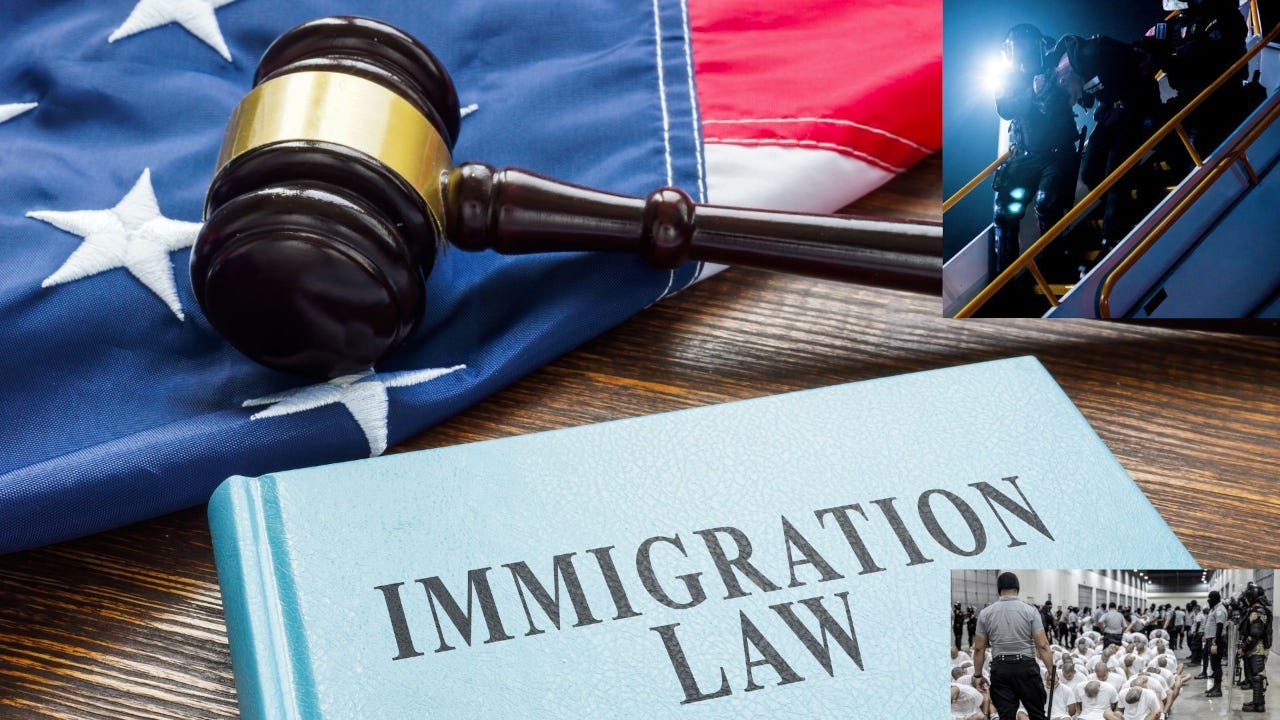Supreme Court Taps the Brakes on Trump’s Deportation Push
Trump’s Fight to Deport Gets Slowed by a Single Phrase: Due Process
President Trump received an unwelcome bit of pushback this morning from the Supreme Court regarding his use of the Alien Enemies Act.
The Supreme Court on Saturday blocked, for now, the deportations of any Venezuelans held in northern Texas under an 18th century wartime law.
In a brief order, the court directed the Trump administration not to remove Venezuelans held in the Bluebonnet Detention Center “until further order of this court.”
Justices Samuel Alito and Clarence Thomas dissented from the order.
Winning In The Court Of Public Opinion
The Supreme Court’s action comes at a time when corporate media’s own polling data indicates the majority of Americans support efforts to deport all “undocumented migrants” illegal aliens from the United States, with more Americans supporting Donald Trump’s immigration policies than opposing them.
At the same time, there have been numerous legal challenges to President Trump’s efforts to deport illegal aliens from the United States, with at least one judge, Judge James Boasberg, not only threatening to hold the Trump Administration in criminal contempt for not complying with his judicial orders but also being the potential target of impeachment proceedings in the House of Representatives over those same orders.
Yet not all federal judges are determined to frustrate President Trump’s policies.
Last week Judge Trevor Neil McFadden ruled in favor of the Trump Administration’s efforts to enforce the alien registration requirements of the Immigration and Nationality Act of 1952.
Federal immigration law has long required that people who aren’t American citizens and live in the U.S., including those here illegally, register with the government. Those laws can be traced back to the Alien Registration Act of 1940, which came amid growing fears of immigrants and political subversives in the early days of World War II. The current requirements stem from the Immigration and Nationality Act of 1952.
This, I should note, aligns with a stance I have long held on this topic, which is that, contrary to much of the corporate media’s propaganda, immigration, both legal and illegal, is strictly a question of law enforcement.
Separately, Judge Jamee Comans ruled that the courts lacked authority to challenge Secretary of State Marco Rubio’s determination that Mahmoud Khalil’s advocacy on behalf of Hamas was contrary to State Department policies on anti-semitism and thus were grounds for revoking his visa and permanent resident status.
During a hearing at the remote Louisiana detention center where Khalil is being held, Judge Jamee Comans said Friday that she had no authority to question Rubio's determination.
This ruling was much to the dismay of many who have sought to cast the Khalil case inaccurately as a predation upon Khalil’s First Amendment rights to Free Speech (it isn’t).
On the surface, the Supreme Court’s order prohibiting deportations from the Bluebonnet Detention Center would appear to be ill-timed, given the decisions within the lower courts that the Trump Administration is fundamentally correct on the application of the law.
However, the Supreme Court has already somewhat sided with Kilmar Abrego Garcia, upholding a Maryland District Court’s order that the Trump Administration “facilitate” his return to the United States from El Salvador.
The Supreme Court on Thursday said that the Trump administration is required to "facilitate" the release of a Maryland man who was wrongly deported to an El Salvador prison.
The court partly granted and partly rejected an emergency request filed by the Justice Department contesting a judge’s order that Kilmar Abrego Garcia be retrieved from a prison in El Salvador where he was sent on March 15 along with alleged Venezuelan gang members.
Thus while President Trump arguably is winning in the court of public opinion, whether his policies are likely to prevail within the federal courts is far less certain.
The Law Says What It Says
In assessing the Supreme Court’s latest order—and indeed all its rulings as well as those of lower courts—we are always well advised to pay heed to the late Justice Antonin Scalia’s pithy advocacy for a textualist view of the Constitution:
The Constitution says what it says and it doesn’t say anything more
The same logic applies to statutory law, and it applies to court orders and opinions as well.
Accordingly, to understand what might be taking place before the Supreme Court we need to start with the text of the order itself1.
There is before the Court an application on behalf of a putative class of detainees seeking an injunction against their removal under the Alien Enemies Act. The matter is currently pending before the Fifth Circuit. Upon action by the Fifth Circuit, the Solicitor General is invited to file a response to the application before this Court as soon as possible. The Government is directed not to remove any member of the putative class of detainees from the United States until further order of this Court.
This order was issued pursuant to an application for an emergency injunction submitted to the court by the plaintiffs, which have a case in litigation in the District Court for the Northern District of Texas2, currently on appeal with the United States Court of Appeals for the Fifth Circuit.
The effect of the order is to give the appellate court an opportunity to rule on the plaintiff’s underlying case before deportation is to proceed.
As I have written previously, in broad terms the invocation of the Alien Enemies Act by President Trump is largely beyond judicial review.
Most crucially, this fundamental lack of judicial authority has been upheld by the Supreme Court specifically with respect to President Trump’s invocation of the AEA3.
Challenges to removal under the AEA, a statute which largely “ ‘preclude[s] judicial review,’ ” Ludecke v. Watkins, 335 U.S. 160, 163−164, (1948), must be brought in habeas. Cf. Heikkila v. Barber, 345 U.S. 229, 234−235 (1953) (holding that habeas was the only cause of action available to challenge deportation under immigration statutes that “preclud[ed] judicial intervention” beyond what was necessary to vindicate due process rights).
However, that same acknowledgement that the AEA precludes judicial review also reaffirms the propriety of habeas corpus petitions for challenging the mechanics of the underlying deportation proceeding.
Thus, while the Court’s earlier ruling in Trump v J.G.G. gives no sense that the Court is inclined to extend judicial review to the Trump Administration’s invocation of the Alien Enemies Act, it explicitly preserves access to habeas corpus petitions for challenging the particular applicability of that invocation to the individual.
We should also note that the precise wording of President Trump’s invocation4 includes a particular finding of fact which may be open to legitimate challenge with respect to the characterization of the persons to be considered Alien Enemies.
Based on these findings, and by the authority vested in me by the Constitution and the laws of the United States of America, including 50 U.S.C. 21, I proclaim that all Venezuelan citizens 14 years of age or older who are members of TdA, are within the United States, and are not actually naturalized or lawful permanent residents of the United States are liable to be apprehended, restrained, secured, and removed as Alien Enemies.
While nationality, age, and immigration status are straightforward and readily ascertainable facts, membership in Tren de Aragua is rather more problematic, and a person who is not a member of Tren de Aragua is not deportable as an Alien Enemy regardless of their immigration status.
Even within the parameters of the Alien Enemies Act, a person subject to detention and deportation under the Alien Enemies Act is entitled to challenge applicability of the AEA to their particular situation via habeas corpus. This was the clear finding of the Supreme Court in Trump v J.G.G, and is consistent with the earlier Luedecke5 ruling which upheld the constitutionality of the AEA.
Trump v J.G.G. also reaffirmed the obligation of the Trump Administration to provide adequate opportunity for habeas petitions to be filed.
For all the rhetoric of the dissents, today’s order and per curiam confirm that the detainees subject to removal orders under the AEA are entitled to notice and an opportunity to challenge their removal. The only question is which court will resolve that challenge. For the reasons set forth, we hold that venue lies in the district of confinement. The dissents would have the Court delay resolving that issue, requiring—given our decision today—that the process begin anew down the road. We see no benefit in such wasteful delay.
We should also note that even the Congress is precluded from suspending the privilege of habeas corpus except under very particular circumstances in Article 1 Section 9 of the Constitution:
The Privilege of the Writ of Habeas Corpus shall not be suspended, unless when in Cases of Rebellion or Invasion the public Safety may require it.
President Trump in his invocation of the AEA does state that Tren de Aragua’s presence in the US constitutes an invasion, but nowhere in his proclamation does he state that habeas corpus is to be denied. The only particular denial of right or privilege he applies to the declared class of Alien Enemies are those available within the Act itself of reasonable time to settle affairs and depart the territory of the United States6.
A Warning To Trump?
Recalling that Trump v J.G.G. obligates the Trump Administration to preserve a clear process for the filing of habeas petitions, we should also consider the possibility that the order is something of an implicit warning to the Trump Administration to be diligent in maintaining that process, and not attempt to frustrate the filing of habeas petitions.,
The petitioners in A.A.R.P v Trump in their original filing have alleged that, among other things, an explicit process for filing habeas petitions has not been provided. Such an omission might occasion the Roberts Court to want to push back against the Trump Administration with respect to AEA deportations (although we should note the irony of a court filing made by petitioners alleging a lack of process for making a court filing). While the precise duties of the Trump Administration with respect to facilitating habeas petitions were not clearly elucidated in Trump v. J.G.G., there is no doubt that every Presidential Administration has a duty to not frustrate any detainee’s capacity for filing a habeas petition.
While we should not presume that “due process” is tantamount to endless legal proceedings and trials, neither should we presume that “due process” can ever functionally become “no process”. At a minimum, outside of the gravest of wartime conditions, even alleged Alien Enemies retain the privilege of habeas corpus, and rightfully so.
While the Supreme Court’s latest order will no doubt be viewed with displeasure by at least a portion of the public, the text of the order itself gives little cause for significant alarm or consternation. The order itself gives no indication of a particular hostility to the Alien Enemies Act or President Trump’s invocation of it. If there were such a hostility, one would expect the Court to have taken a different stance in Trump v J.G.G.
Ultimately, the Supreme Court has issued an order temporarily suspending deportations from the Bluebonnet Detention Center, neither more nor less. The Supreme Court has not rendered an opinion, and the order is not a final rendition of what the law surrounding the Alien Enemies Act is, nor is it a final rendition of what the law is regarding deportations under the Act, or even generally.
The order is, both in effect and likely subtext, a reminder that “due process” is never “no process”. There is little basis for reading more into the order than that, and we do well not to do so.
United States Supreme Court, A.A.R.P., et al. v Donald J. Trump, President of the United States, et al, Docket 24A1007
United States District Court for the Northern District of Texas, A.A.R.P., et al. v Donald J. Trump, President of the United States, et al, Case 1:25-cv-0059
Trump v. J. G. G., 604 U.S. ___ (2025)
Donald J. Trump. Invocation of the Alien Enemies Act Regarding the Invasion of The United States by Tren De Aragua. 14 Mar. 2025, https://www.whitehouse.gov/presidential-actions/2025/03/invocation-of-the-alien-enemies-act-regarding-the-invasion-of-the-united-states-by-tren-de-aragua/.
Ludecke v. Watkins, 335 U.S. 160 (1948)









The Biden administration knew what it was doing. By having a defacto open border policy guaranteed the system would be overwhelmed. Thus setting up this crisis. Tell me again how many million illegals were deported under Obama? And in each and every case due process was followed to the utmost?
Peter, you’re so good at this. There’s a lot of hair-splitting and legal mumbo-jumbo in this whole situation, so I appreciate you spelling it all out for us. I thought you made a perfectly reasoned argument in your previous post, so I was perplexed when the Supreme Court came up with this temporary ruling. Frankly, it feels politically motivated to me. The Supreme Court better be as good at reasoning as you are in their final ruling!